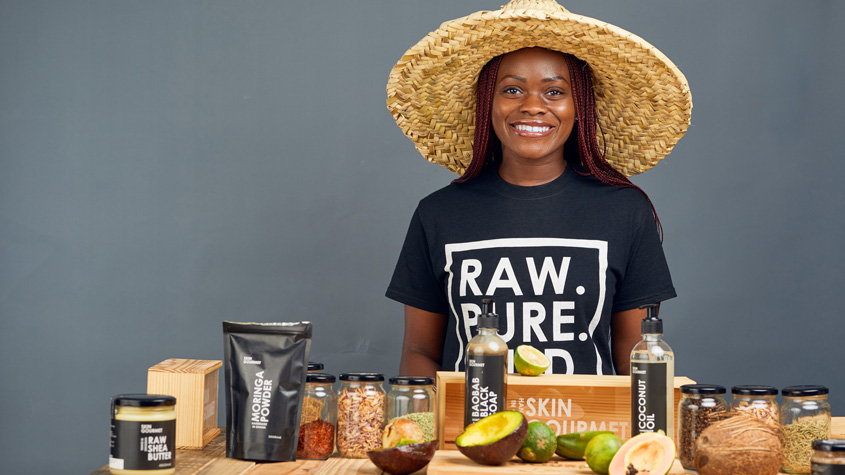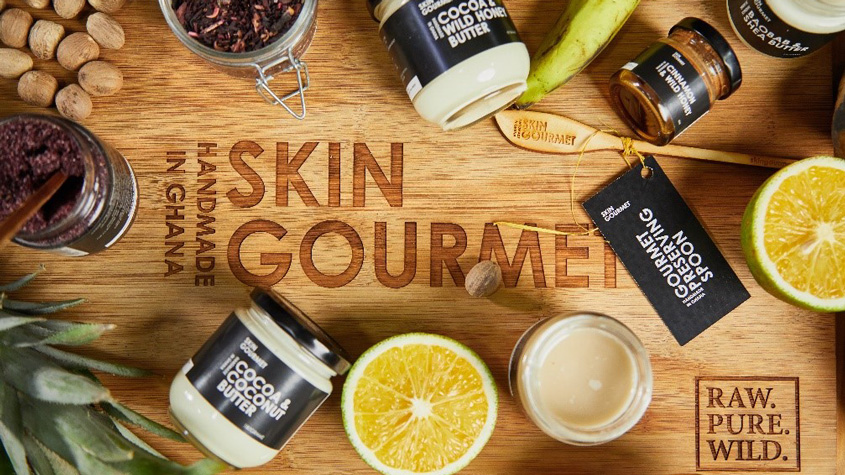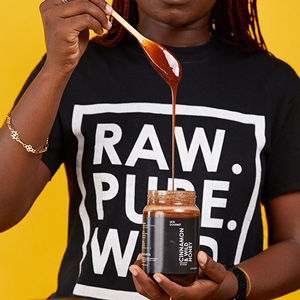
SkinGourmet: Ghana’s Edible Skincare Revolution
By Matilda Frimpong, News and Media Division, WIPO
When it comes to skincare, there are many ingredients that promise to transform our skin – hyaluronic acid, vitamin C, retinol – but what if the secret to glowing skin could be found in your kitchen? That’s the philosophy behind SkinGourmet, a brand seeking to transform the beauty industry with their organic, edible skincare products.

It all started when Violet Amoabeng, the founder of SkinGourmet, discovered the power of natural ingredients in her native Ghana. “I was looking for something to soothe my dry lips, and that was when someone recommended Ghanaian shea butter,” she recalls. “I started using the butter on my lips and I was amazed at how effectively it worked. That’s when I realized the power of the natural ingredient and what Ghana had.”
In 2014, the idea came to life and she launched the company in Accra with just USD 45 and a dream to “Develop People One Jar at a Time.”
From there, Amoabeng began experimenting with other raw ingredients sourced from Ghana, such as moringa, baobab, and cocoa. The result was a line of organic skincare products that are not only good for your skin, but good enough to eat. “We believe that what you put on your skin should be safe enough to eat,” says Amoabeng. “After all, your skin absorbs everything you put on it.”
SkinGourmet is much more than a beauty brand – it’s a movement. By leveraging their trademarks, which protect the distinctive typography of their distinct logo, and words RAW. PURE. WILD. Amoabeng is building a brand that’s known for its commitment to natural ingredients, sustainability, and social impact. When you visit SkinGourmet’s social media page, its active commitment to these principles is clear. “Fellow Ghanaians, Please EAT Your Skincare," is a direct call to action for the Ghanaian community they operate in.

 on YouTube ). (Photo: Courtesy of SkinGourmet)
on YouTube ). (Photo: Courtesy of SkinGourmet)But their intellectual property goes beyond their logo. Skin Gourmet’s unique approach to using raw Ghana-sourced plants, such as shea, baobab, and cocoa, has resulted in a range of skincare products that are free from preservatives, parabens, and artificial fragrances. While their ingredients are sourced from nature, the product recipes are carefully guarded as trade secrets.
SkinGourmet’s commitment to intellectual property is paying off in more ways than one. In creating a strong brand identity around a unique selling point, they are also helping to preserve the cultural heritage and intellectual property of the local farmers they work with.
“Intellectual property is not just about protecting our brand – it’s also about protecting the communities we work with,” says Amoabeng. “We want to ensure that the farmers who grow these incredible ingredients are well compensated and that their cultural heritage is preserved. Let’s not just jump on the bandwagon of consumerism - let’s preserve our culture too.”
Intellectual property is not just about protecting our brand – it’s also about protecting the communities we work with.
Violet Amoabeng

your skin and good enough to eat!
(Photo: Courtesy of SkinGourmet)
The Accra-based company is also firmly committed to sustainability.
SkinGourmet uses eco-friendly packaging for its full product range and as the team works directly with local farmers to source their ingredients, the company is also boosting the local economy, enriching agricultural value chains and promoting sustainable farming practices.
Today, SkinGourmet has a dozen employees and ships its products to over 25 countries around the world. Their signature product, the SkinGourmet Raw Shea Butter, is made with pure shea butter and has become a cult favorite among beauty enthusiasts.
So what does edible skincare actually taste like?
We put SkinGourmet’s Raw Shea Butter to the test. It’s thick and creamy texture has a slightly nutty flavor and tastes like almond butter with a hint of coconut. While I might not eat it by the spoonful, the fact that it’s safe to ingest is testimony to the purity of SkinGourmet’s ingredients.
As the beauty industry continues to shift towards sustainability and transparency, SkinGourmet has every chance of being at the forefront of sustainable skincare in sub-Saharan Africa. By proving that natural, organic ingredients are just as effective (if not more so) than their synthetic counterparts, SkinGourmet is setting a new standard for what we should expect from our skincare products. So the next time you’re slathering on your moisturizer, ask yourself – could I eat this?
The WIPO Magazine is intended to help broaden public understanding of intellectual property and of WIPO’s work, and is not an official document of WIPO. The designations employed and the presentation of material throughout this publication do not imply the expression of any opinion whatsoever on the part of WIPO concerning the legal status of any country, territory or area or of its authorities, or concerning the delimitation of its frontiers or boundaries. This publication is not intended to reflect the views of the Member States or the WIPO Secretariat. The mention of specific companies or products of manufacturers does not imply that they are endorsed or recommended by WIPO in preference to others of a similar nature that are not mentioned.